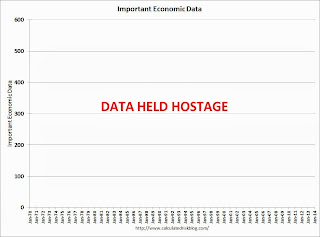[T]he growing crisis [the Depression], spurred action on improving employment statistics. In July [1930], Congress enacted a bill sponsored by Senator Wagner directing the Bureau to "collect, collate, report, and publish at least once each month full and complete statistics of the volume of and changes in employment." Additional appropriations were provided.In the early stages of the Depression, policymakers were flying blind. But at least they recognized the need for better data, and took action. All business people know that when there is a problem, a key first step is to measure the problem. That is why I've been a strong supporter of trying to improve data collection on the number of households, vacant housing units, foreclosures and more. Unfortunately that hasn't happened, and in fact there has been an effort to reduce the amount of data collected.
emphasis added
 Click on graph for larger image.
Click on graph for larger image.Back in May, the House voted to kill the American Community Survey, a survey that is widely used by businesses and economists. Fortunately that vote was criticized across the political spectrum.
A couple of examples, first an editorial from the WSJ: Republicans try to kill data collection that helps economic growth
The House voted 232 to 190 to abolish the Census's American Community Survey, or ACS, which is the new version of the long-form questionnaire and is conducted annually. Republicans claim the long form—asking about everything from demographics to income to commuting times—is prying into private life and is unconstitutional.And AEI's Norman Ornstein at Roll Call: Research Cuts Are Akin to Eating Seed Corn
In fact, the ACS provides some of the most accurate, objective and granular data about the economy and the American people, in something approaching real time. Ideally, Congress would use the information to make good decisions. Or economists and social scientists draw on the resource to offer better suggestions. Businesses also depend on the ACS's county-by-county statistics to inform investment and hiring decisions. As the great Peter Drucker had it, you can't manage or change what you don't measure.
...
Since the political class is attempting to define the GOP as insane and redefine "moderation" as anything President Obama favors, Republicans do themselves no favors by targeting a useful government purpose.
[S]ignificant was the House vote to eliminate the annual American Community Survey and the Economic Census to provide basic information on the state of businesses and industries in the country and data used for generating quarterly gross domestic product estimates.Once again the House is depriving us of data, and right now we are flying blind. In the short term this is a minor inconvenience compared to the widespread suffering related to the shutdown, but once again this shutdown is "evidence of ideology run rampant".
If ever we need evidence of ideology run rampant, these actions become exhibit A. Learning about the population and about the economy are fundamental for a society to understand where it has been and where it is going ...